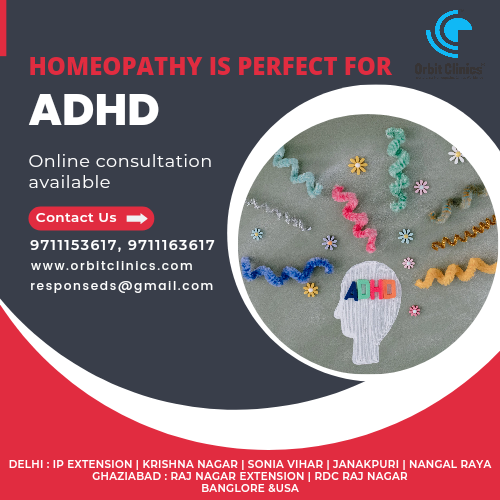Unlocking the Potential of Homeopathy in Treating ADHD: A Holistic Approach

Written by
Dr. Deepak Sharma
BHMS, MD, Ph.D. (Scholar)
Homeopathic Physician and Educator
Founder – Orbit Clinics
Introduction
Attention Deficit Hyperactivity Disorder (ADHD) is a prevalent neurodevelopmental condition affecting millions of children and adults worldwide. Characterized by inattention, impulsivity, and hyperactivity, ADHD can significantly impact an individual’s academic, social, and professional life. Traditional treatments, such as medication and behavioral therapy, have shown to be effective in managing ADHD symptoms; however, the side effects and limitations of these interventions have prompted the exploration of alternative treatments. Among these is homeopathy, a holistic and natural approach to healing that is gaining momentum in the field of ADHD treatment. In this article, we delve into the world of homeopathy, examining its potential role in managing ADHD symptoms and supporting overall well-being.
What is Homeopathy?
Homeopathy is a system of alternative medicine that has its roots in the late 18th century, founded by the German physician Samuel Hahnemann. It is based on the principle of “like cures like” – the idea that a substance causing symptoms in a healthy person can cure similar symptoms in a sick person when administered in a highly diluted form. Homeopathic remedies are created by diluting natural substances, such as plants, minerals, or animal-derived materials, to a point where the original substance may no longer be detectable. Proponents of homeopathy believe that these diluted remedies can stimulate the body’s natural healing processes and restore balance.
ADHD and Homeopathy: A New Perspective
Homeopathy offers a unique perspective on ADHD, viewing it not as a disorder requiring medication but as an expression of an underlying imbalance within the individual. Homeopathic practitioners believe that ADHD symptoms can be managed by addressing the root causes of the imbalance and promoting overall well-being. This approach entails a comprehensive assessment of the patient, including physical, emotional, mental, and environmental factors, to determine the most appropriate homeopathic remedy.
The Potential Benefits of Homeopathy for ADHD
- Individualized treatment: Homeopathy takes into account the uniqueness of each individual, tailoring the treatment to the patient’s specific needs. This personalized approach may be especially beneficial for individuals with ADHD, as it addresses the underlying factors contributing to their symptoms and ensures the treatment is tailored to their specific requirements.
- Gentle and natural: Homeopathic remedies are derived from natural sources and are administered in highly diluted forms, making them a gentle and non-invasive treatment option. This is particularly appealing to parents seeking an alternative to conventional ADHD medications, which may cause undesirable side effects.
- Complementary therapy: Homeopathy can be used alongside conventional treatments such as medication and behavioral therapy, potentially enhancing their effectiveness and providing additional support for individuals with ADHD. This integrative approach to treatment may offer patients the best of both worlds, combining the benefits of conventional and alternative therapies.
- Holistic approach: Homeopathy focuses on the overall well-being of the individual rather than solely targeting the symptoms. This holistic approach may provide individuals with ADHD with the tools they need to lead more balanced and fulfilling lives.
Several homeopathic remedies are frequently employed to address symptoms associated with ADHD, including:
- Stramonium: This remedy is generally administered to individuals who startle easily, harbor a fear of darkness, and display aggressive behavior, and is often used to address hyperactivity, aggression, and night terrors.
- Cina: This remedy is employed to mitigate irritability, restlessness, and mood fluctuations.
- Tuberculinum: This remedy is commonly prescribed for restless, impulsive individuals prone to hyperactivity.
- Hyoscyamus: This remedy is typically used for individuals who are easily sidetracked, exhibit impulsivity, and engage in attention-seeking behavior.
- Phosphorus: This remedy is often administered to individuals with high energy levels who may be prone to distraction but also possess a creative and imaginative disposition.
Emerging Research and Future Directions
Although there is a growing body of anecdotal evidence supporting the use of homeopathy for ADHD, rigorous scientific research is still limited. However, a few studies have shown promising results, with homeopathic remedies demonstrating effectiveness in reducing ADHD symptoms and improving overall functioning. Further research is needed to establish a solid evidence base for the use of homeopathy in ADHD treatment and to determine its precise mechanisms of action.
Conclusion
Homeopathy offers a natural, holistic, and individualized approach to treating ADHD, addressing the root causes of the condition and promoting overall well-being. While research is still in its infancy, the potential benefits of homeopathy for ADHD patients are encouraging. As our understanding of the relationship between ADHD and homeopathy continues to grow, it may pave the way for the development of more integrative and comprehensive treatment strategies for individuals living with ADHD.
References:
- American Psychiatric Association. (2013). Diagnostic and statistical manual of mental disorders (5th ed.). Arlington, VA: American Psychiatric Publishing.
- Frei, H., Everts, R., von Ammon, K., Kaufmann, F., Walther, D., Hsu-Schmitz, S.-F., Collenberg, M., Fuhrer, K., Hassink, R., Steinlin, M., & Thurneysen, A. (2005). Homeopathic treatment of children with attention deficit hyperactivity disorder: A randomised, double blind, placebo controlled crossover trial. European Journal of Pediatrics, 164(12), 758-767. doi:10.1007/s00431-005-1695-8
- Hahnemann, S. (1996). Organon of medicine (6th ed., J. Kunzli, A. Naude, & P. Pendleton, Trans.). Los Angeles, CA: J. P. Tarcher.
- Lamont, J. (1997). Homoeopathic treatment of attention deficit hyperactivity disorder: A controlled study. British Homoeopathic Journal, 86(4), 196-200. doi:10.1016/S0007-0785(97)80002-6
- Oberai, P., Gopinadhan, S., Varanasi, R., Mishra, A., Singh, V., Nayak, C., . . . Mathew, G. (2013). Homoeopathy in the treatment of attention deficit hyperactivity disorder: A randomised placebo-controlled pilot trial. Indian Journal of Research in Homoeopathy, 7(4), 158-167.
- Ullman, D. (2007). The homeopathic treatment of children: Pediatric constitutional types. Berkeley, CA: North Atlantic Books.
- Weber, W., Vander Stoep, A., McCarty, R. L., Weiss, N. S., Biederman, J., & McClellan, J. (2008). Hypericum perforatum (St John’s Wort) for attention-deficit/hyperactivity disorder in children and adolescents: A randomized controlled trial. Journal of the American Medical Association, 299(22), 2633-2641. doi:10.1001/jama.299.22.2633



